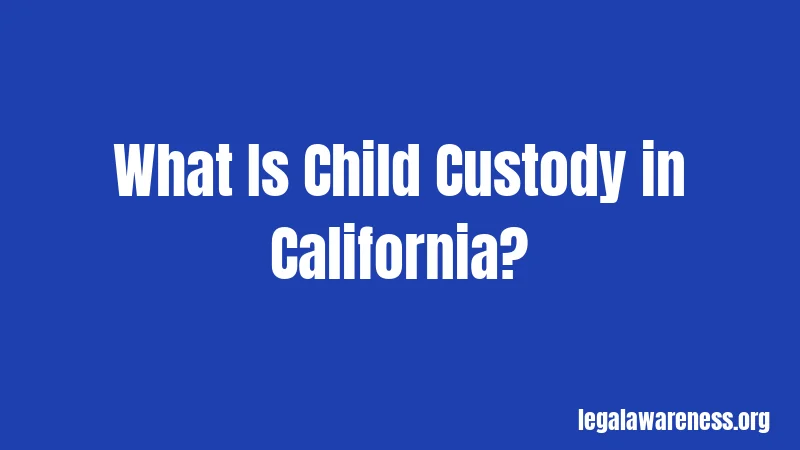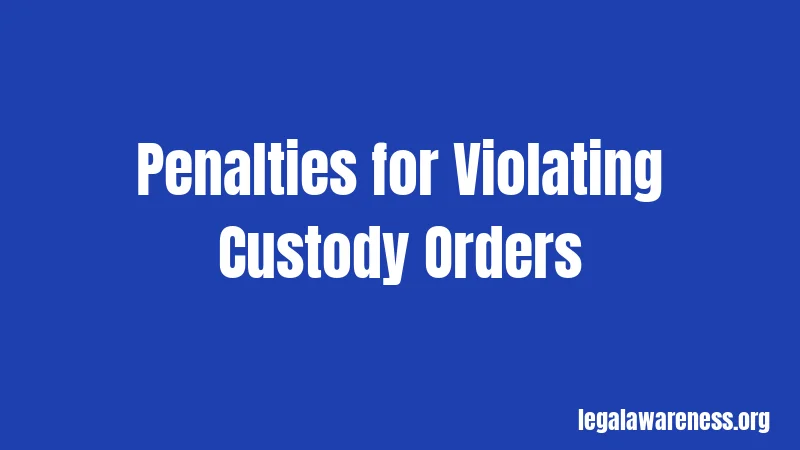Custody Laws in California (2026): Rules That Actually Matter
Most parents going through separation have no idea how strict California custody laws really are. Seriously. The rules changed in 2025, and judges are looking at things differently now. Let’s break down what you actually need to know.
California takes child custody seriously. Like, really seriously. The state updated its laws in 2025 to protect kids better, especially in cases involving domestic violence. If you’re dealing with custody issues right now, these changes could affect your case in major ways.
What Is Child Custody in California?

Think of custody in two parts. Legal custody and physical custody. They’re different things.
Legal custody means you get to make big decisions for your kid. We’re talking about school choices, medical care, and religious upbringing. The important stuff.
Physical custody is simpler. It’s about where your child actually lives and who takes care of them day-to-day.
Here’s the deal. Each type can be either sole or joint. Sole means one parent has the rights. Joint means you share them. Pretty straightforward.
Basic Custody Arrangements
Joint Custody
Most California cases end up with some form of joint custody. The court prefers this when both parents are fit and able.
With joint legal custody, both parents share decision-making. You both get a say in the big choices. With joint physical custody, your kid lives with both of you for significant amounts of time.
Wondering if this applies to you? It probably does if both parents are capable and there’s no abuse involved.
Sole Custody
Sometimes one parent gets sole custody. This happens when the other parent has serious issues. Abuse, neglect, addiction. Those kinds of problems.
If you have sole legal custody, you make all the important decisions alone. Sole physical custody means your child lives primarily with you. The other parent might get visitation, but that’s it.
The Best Interest Standard (This One’s Important)

California judges use something called the “best interest of the child” standard. It’s in Family Code Section 3011. Basically, every decision revolves around what’s best for your kid.
Not what’s easiest for you. Not what’s fair to the parents. What’s best for the child.
The court looks at specific factors:
Child’s Health and Safety
This comes first. Always. Is your child safe? Are their basic needs met? Does the home environment support their wellbeing?
History of Abuse
Hold on, this part is important. If there’s any history of abuse, the court takes it very seriously. This includes abuse against the child, the other parent, or anyone else in the household.
California has a presumption against giving custody to someone who committed domestic violence in the past five years. That’s a tough barrier to overcome.
Relationship With Each Parent
Quality matters more than quantity here. A parent who sees the kid every other weekend but really engages can do better than someone who’s physically present but emotionally absent.
The court wants to see genuine connection. Not just time on a calendar.
Substance Abuse Issues
Drug or alcohol problems are red flags. Huge ones. California law specifically addresses this in Family Code Section 3011.
But here’s the thing. Past addiction doesn’t automatically disqualify you. If you’ve been sober, followed treatment, and stayed clean, you can still get custody. The court needs to see you’re stable now.
Child’s Preference
Confused about whether your kid’s opinion matters? It depends on their age and maturity.
California doesn’t have a specific age cutoff. Instead, judges consider whether the child is mature enough to express a reasoned preference. Usually this means kids around 14 or older, but younger children might be heard too.
New Laws in 2025 (Okay, Pay Attention Here)
California made big changes to custody laws in 2025. These aren’t small tweaks. They’re substantial shifts.
Domestic Violence Protections
Courts now give much more weight to domestic violence history. Judges ask detailed questions about any abuse. They require more documentation.
If there’s been violence, the court can order supervised visitation. They might require co-parenting counseling. Or they might deny custody altogether.
Firearm Restrictions
New in 2026. Courts must consider illegal firearm possession when making custody decisions. If you violated firearm laws, especially with domestic violence involved, it affects custody.
This reinforces the presumption against giving custody to someone with a violent history.
Maintaining Stability
Courts now prioritize keeping kids in their current schools and activities. This is especially true in areas with strong education systems.
Moving your child away from their established routine? The court might say no, even if you have good reasons.
Co-Parenting Communication
Judges can now order parents to use co-parenting apps. These apps reduce conflict by keeping communication documented and civil.
For high-conflict situations, courts might order parallel parenting. This minimizes direct contact between parents while keeping both involved with the child.
Penalties for Violating Custody Orders

You’re not alone if you’re wondering what happens when someone breaks a custody order. Lots of people don’t realize how serious this is.
Civil Contempt
First violation? The court might give a warning. But if you keep breaking the order, consequences get real.
Penalties include:
- Fines up to $1,000
- Jail time up to 5 days for first offense
- Community service up to 120 hours
- Changes to the custody arrangement
- Loss of custody time
Criminal Charges
Taking your child in violation of a custody order isn’t just contempt. It can be child abduction under Penal Code 278.5.
This is serious. We’re talking felony charges.
Maximum penalties include:
- Up to 3 years in state prison
- Fines up to $10,000
- Restitution for costs of finding and returning the child
- Loss of custody rights
Wait, it gets worse. If you take multiple children, you could face separate charges for each one.
When Violations Might Be Justified
Sound complicated? It’s actually pretty clear. You can only violate a custody order if your child is in immediate danger.
If the other parent is abusive or keeps illegal items in their home, you can’t send your kid into danger. But you must immediately tell the court. Document everything. Don’t just take matters into your own hands.
How Courts Make Custody Decisions
Let’s talk about the actual process. Here’s what happens in California family court.
Initial Hearings
When you file for custody, the court schedules a hearing. Both parents present their case. You’ll need evidence, witnesses, and documentation.
Honestly, this is where having a lawyer really helps. But you can represent yourself if needed.
Mediation Requirements
California requires mediation before contested custody hearings. This is mandatory in most counties.
A neutral mediator helps you and the other parent work out an agreement. If you reach one, great. If not, you go to trial.
Recent changes expanded funding for mediation programs. Courts are pushing harder for parents to settle without trials.
Custody Evaluations
Sometimes the court orders a custody evaluation. A professional evaluator interviews both parents, the child, and relevant witnesses.
They visit your homes. They review records. Then they make recommendations to the judge.
These evaluations carry serious weight. The judge usually follows the evaluator’s recommendations unless there’s a strong reason not to.
Trial
If mediation fails, you go to trial. Both sides present evidence. The judge makes the final decision based on the best interest standard.
Trials take time. They’re expensive. And they’re emotionally draining. Most cases settle before reaching this point.
Special Situations
Relocation Cases
Want to move with your child? California has specific rules about this.
For moves within the state, the court looks at how it affects the child’s stability and the other parent’s visitation. For moves out of state, the scrutiny gets even tougher.
Key questions judges ask:
- How far is the move?
- What’s the reason for moving?
- How involved is the non-moving parent?
- Will the child’s school and community be disrupted?
Not sure what counts as a relocation? Generally, any move that substantially affects the other parent’s ability to exercise their custody rights.
Non-Parent Custody
Grandparents, stepparents, and other relatives can sometimes get custody. California recognizes that kids form important bonds with non-parent caregivers.
But the legal standard is higher. You need to prove that custody with a non-parent serves the child’s best interest better than with either biological parent.
Domestic Violence Cases
These get special treatment under Family Code Section 3044. There’s a rebuttable presumption against giving custody to someone who committed domestic violence within the past five years.
“Rebuttable” means they can overcome it with strong evidence. But it’s tough. They need to prove that giving them custody is actually in the child’s best interest AND that the child will be safe.
Courts may require:
- Supervised visitation only
- Protective orders
- Completion of batterer’s treatment programs
- Drug and alcohol testing
Emergency Custody Orders
If your child is in immediate danger, you can request an emergency custody order. These are called ex parte orders.
The court can grant them without the other parent present. But you need clear evidence of immediate harm. Not just disagreement or inconvenience. Actual danger.
Creating a Strong Parenting Plan
Okay, let’s get practical. How do you create a parenting plan that actually works?
Be Specific
Vague plans cause problems. Your custody order should spell out:
- Exact pickup and drop-off times
- Specific locations for exchanges
- How holidays and vacations work
- Who makes which decisions
- How you handle schedule changes
The more detailed, the better. Trust me, this works.
Address Common Issues
Good parenting plans anticipate problems:
- What if one parent needs to cancel a visit?
- How much notice for vacation plans?
- Can the child travel out of state?
- Who gets which holidays?
- How do you communicate about the child?
Think through scenarios before they become conflicts.
Use Court Forms
California has helpful forms for creating detailed custody schedules:
- Child Custody and Visitation Attachment (Form FL-311)
- Children’s Holiday Schedule Attachment (Form FL-341(C))
- Additional Provisions Physical Custody Attachment (Form FL-341(D))
These forms walk you through important details. Use them.
How to Enforce Custody Orders
What do you do when the other parent violates the custody order? You’ve got options.
Document Everything
First step. Keep records of every violation. Save texts, emails, voicemails. Write down dates, times, what happened. Get witness names and contact info.
This documentation becomes crucial if you go to court.
Talk to the Other Parent
Before involving the court, try talking. Sometimes violations stem from misunderstandings or scheduling mix-ups.
Stay calm. Be reasonable. See if you can work it out.
File a Motion to Enforce
If talking doesn’t work, file a motion asking the court to enforce the order. The judge reviews your evidence and can:
- Remind the violating parent of their obligations
- Impose penalties
- Modify the custody order
- Hold them in contempt
Request a Contempt Hearing
This is more serious. You’re asking the court to find that the other parent willfully violated the order.
If found guilty, they face:
- Fines
- Jail time
- Loss of custody or visitation time
- Payment of your attorney fees
When to Involve Police
Law enforcement’s role is limited in civil custody matters. But they can help with:
- Active kidnapping situations
- Violations of protective orders
- Clear criminal violations
Have a copy of your custody order ready to show them. The more specific your order, the easier it is for police to understand and enforce.
Rights of Both Parents
Let me be clear about something. Both parents have rights in California, regardless of gender.
Mothers Don’t Get Automatic Preference
California law prohibits gender bias. Courts cannot favor mothers just because they’re mothers. Period.
The only question is: what’s best for the child?
Fathers Have Equal Rights
Dads have the same legal rights as moms. They can get sole custody. They can get joint custody. Courts must treat them equally.
The key is showing you can provide a stable, loving, supportive environment.
Unmarried Parents
If you weren’t married when your child was born, the father needs to establish paternity first. This can be done by:
- Signing a voluntary declaration of paternity
- Court order
- DNA testing
Once paternity is established, unmarried fathers have the same custody rights as married fathers.
Working With Lawyers
Should you hire a lawyer? Honestly, for custody cases, it usually helps.
When You Really Need One
You definitely want legal help if:
- There’s domestic violence involved
- The other parent has a lawyer
- Your case is complicated
- You’re dealing with relocation
- There are abuse or neglect allegations
What Lawyers Cost
Family law attorneys in California aren’t cheap. Expect to pay anywhere from $250 to $500+ per hour in most areas. Major cities cost more.
Some lawyers offer payment plans. Legal aid organizations help low-income parents. Look into your options.
Representing Yourself
You can represent yourself in custody cases. California courts have self-help centers with free resources and forms.
It’s harder without a lawyer, but people do it successfully. You’ll need to:
- Learn court procedures
- File proper paperwork
- Present evidence effectively
- Follow all rules
Tips for Success in Custody Cases
Want to improve your chances? Here’s what actually works.
Put Your Child First
This sounds obvious, but it’s crucial. Make decisions based on what’s best for your kid, not what hurts your ex.
Judges see through spite. They reward parents who genuinely prioritize their children.
Stay Calm and Professional
Don’t badmouth the other parent. Not to the judge. Not to the kids. Not in texts or emails.
Everything you say might end up as evidence. Keep it civil, even when you’re frustrated.
Be Flexible
Rigid parents have problems. Show you can compromise when appropriate. Be willing to work with the other parent on schedule changes, special events, and unexpected situations.
This demonstrates you’re focused on co-parenting, not conflict.
Maintain Stability
Keep your child in the same school if possible. Continue their activities and routines. Provide a safe, clean home environment.
Stability matters. A lot.
Follow Court Orders
Never violate custody orders, even if you think the other parent is wrong. Go through proper legal channels to address problems.
Violating orders hurts your case, no matter what the other parent did.
Frequently Asked Questions
Can I move out of state with my child?
Not without permission. If you have a custody order, you need either the other parent’s written consent or court approval. Moving without permission violates the custody order and could result in serious consequences, including loss of custody.
What age can a child decide which parent to live with?
California doesn’t have a specific age. Courts consider the child’s maturity and ability to express a reasoned preference. Usually kids 14 and older have their preferences given significant weight, but it’s not automatic. The judge still decides based on the child’s best interest.
How do I modify an existing custody order?
File a motion to modify with the court. You need to show that circumstances have significantly changed since the original order. Examples include relocation, change in work schedule, substance abuse issues, or the child’s needs changing as they grow older.
Can grandparents get custody or visitation rights?
Yes, but it’s harder than for parents. Grandparents must prove that custody or visitation serves the child’s best interest and that denying it would be harmful to the child. If both parents are fit, courts generally prefer parental custody.
What happens if I can’t afford a lawyer?
Several options exist. Legal aid organizations provide free or low-cost help to qualifying low-income individuals. Many courts have self-help centers with free resources. Some lawyers offer payment plans or limited-scope representation where they help with specific parts of your case.
Final Thoughts
California custody laws prioritize one thing above all else: your child’s wellbeing. The 2025 changes strengthened protections, especially for kids in dangerous situations.
If you’re going through a custody case, document everything. Follow court orders exactly. Put your child first. And seriously consider getting legal help, especially if things are complicated.
The system isn’t perfect, but it works better when parents focus on their kids instead of fighting each other. Stay informed, stay calm, and when in doubt, consult with a family law attorney who knows California’s current laws.
References
- California Family Code Section 3011 – Best Interest of Child Standard https://leginfo.legislature.ca.gov/faces/codes_displaySection.xhtml?sectionNum=3011&lawCode=FAM
- California Family Code Section 3044 – Domestic Violence Presumption https://leginfo.legislature.ca.gov/faces/codes_displaySection.xhtml?sectionNum=3044&lawCode=FAM
- California Penal Code Section 278.5 – Child Abduction/Deprivation of Custody https://leginfo.legislature.ca.gov/faces/codes_displaySection.xhtml?sectionNum=278.5&lawCode=PEN
- California Courts Self-Help Guide – Child Custody https://selfhelp.courts.ca.gov/child-custody
- California Lawyers Association – 2025 Family Law Legislative Updates https://calawyers.org/family-law/2025-legislative-update-new-laws/
